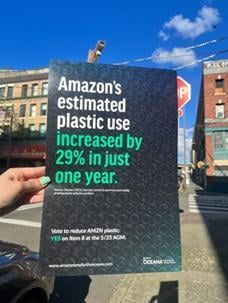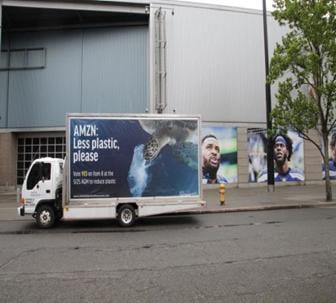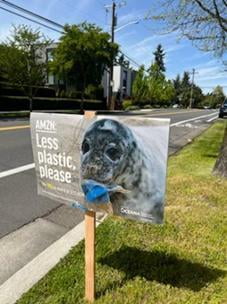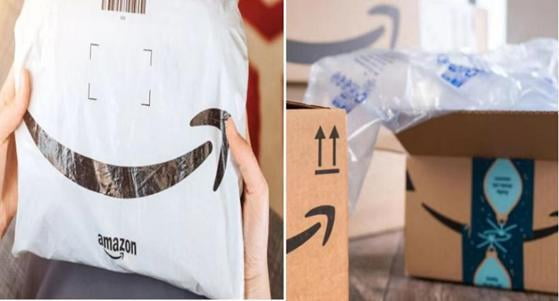At 48.6 percent, just shy of the halfway mark, global e-commerce giant Amazon's plastic reduction plan was not approved by shareholders at its annual meeting. Environmental group Oceana's corporate advocacy effort to "get in close" with Amazon ended in failure.
Oceana is not discouraged by this result. On a positive note, the plastic reduction proposal received 1,8129,6823 votes in favor, for a 48.6% approval rate. "If you remove the votes of Amazon's leadership and insiders, the proposal is passable." Matt Littlejohn, senior vice president of Oceana, said the fact that nearly half of Amazon shareholders spoke out for Oceana sends a clear message that:Amazon, it's time to solve the plastic pollution problem you brought!
Environmental groups and e-commerce giants diverge on plastic reduction: fighting alliances, arguing the case.
All along, Amazon has not performed well in preventing and eliminating plastic pollution. Oceana's new report, "Revealed: Amazon poses a huge and growing plastic pollution problem," shows that Amazon generates 270,000 tons of plastic packaging waste in 2020, up 29 percent from 210,000 tons in 2019; ultimately, more than 10,000 tons of plastic packaging waste is spilled into sewers and the marine environment.
Amazon, however, does not agree with the report. In its 2022 proxy statement, Amazon explained that Amazon's contribution to plastic reduction is primarily reflected in its leveraging of its platform to help its resident merchants reduce their use of plastic packaging and reduce the amount of plastic used in secondary packaging at the platform's shipping point. "Since 2015, we have reduced the amount of secondary packaging materials used by at least 1 million tons, or 36 percent of total usage."
Oceana points out that Amazon's total plastic packaging usage amounts to millions of tons per year. As an e-commerce giant, Amazon's plastic reduction efforts are far from adequate.
A shareholder has submitted a plastic reduction proposal to Amazon, asking Amazon to report to the community on its use of plastic packaging and to develop a program to reduce its plastic footprint. The vote is scheduled for May 25, the day of Amazon's annual shareholder meeting.
Amazon asked other shareholders to oppose the program, arguing that it had done its duty to reduce plasticity. Yet Oceana didn't give up. Oceana began a series of lobbying and advocacy efforts to get the program passed and to get Amazon to undertake packaging plastic reduction efforts.
First, Oceana lobbied and supported Amazon employees and shareholders in a plastic reduction campaign at Amazon's headquarters to garner more shareholder support on the ground. With the theme "Amazon: Please Use Less Plastic," the campaign raised awareness and support for plastic reduction programs by showing photos of marine animals eating plastic or being entangled in plastic.
The campaign team also set up 1,000 signs and 500 posters in Seattle and conducted information gathering for supporters around Amazon's headquarters.



In addition, Oceana encourages Amazon investors who are signatories to the UN Principles for Responsible Investment (PRI) to support plastic reduction programs. Many Amazon shareholders are PRI members who have pledged to expose environmental, social and corporate governance issues at their portfolio companies, and plastic pollution is a key aspect of that. Oceana is therefore calling on these investors to honor their PRI pledge and vote for the plastic reduction proposal.
At the same time, Oceana set up a dedicated action page to provide information about Amazon's plastic use, campaigns for plastic reduction proposals, consumer petitions for plastic reduction, and other related information, calling on more stakeholders to send plastic reduction proposals to Amazon.
Finally, Oceana also sent a letter to Amazon shareholders setting out five reasons for supporting the plastic reduction program.
First, Amazon is a major generator of plastic packaging waste, and Oceana reports that Amazon will generate 270,000 tons of plastic packaging waste in 2020.
In response, Amazon said the data was inaccurate and was more than four times the amount of its true plastic packaging waste.
However, when Oceana repeatedly asked Amazon to provide specific data and details of the company's reference benchmarks, Amazon did not respond.
Even if Amazon's claims are true, Amazon's plastic packaging use will still be as high as 68,000 tons in 2020, and given the very low recycling rate of Amazon's plastic packaging, Amazon remains a major plastic packaging user and waste producer.
Second, Amazon has not adequately responded to and addressed the plastic pollution issues it brings.
As one of the world's largest retailers, Amazon is an industry leader in many ways and has been influential in defining how products are packaged. But when it comes to plastic, Amazon has neither published its plastic footprint nor made any commitments to reduce the amount of plastic packaging it uses. With its existing resources, Amazon is well positioned to innovate on packaging and reduce the use of plastic packaging.

Third, the plastics used by Amazon are often not recycled locally and are difficult to recycle through Amazon's alternative recycling stores.
Amazon claims that recycling can help solve its plastic packaging pollution problem, but Oceana research found that the plastic packaging used by Amazon falls into the plastic film category, a material that is extremely difficult to recycle, and in large Amazon markets such as the United States and the United Kingdom, most of their municipal road waste recycling programs do not involve plastic film.
To address the recycling challenge, Amazon says some of its stores can serve as alternative recycling sites. Oceana sent people disguised as shoppers to conduct a confidential survey of 186 Amazon stores of this type, and as a result, 41 percent of the surveyors said that representatives at the stores surveyed refused to recycle plastic packaging; more than 80 percent of the managers at the stores surveyed said they were not aware that their stores could serve as alternative recycling sites.
Fourth, the situation of marine plastic pollution is very serious, requiring urgent action by head companies such as Amazon. It is estimated that approximately 15 million tons of plastic waste enters the oceans globally each year. In addition, between 2009 and 2020, there were nearly 1,800 cases of marine animals ingesting or becoming entangled in plastic, 88 percent of which are endangered species according to U.S. regulations.
By 2050, the plastics industry's annual production is expected to more than triple, and if no action is taken, the amount of plastic entering the ocean will triple by 2040.
Given that the global recycling rate for plastics is only 9%, recycling is not the best solution to marine plastic pollution; reducing the production and use of plastics is more important. As a major producer of plastic packaging waste, Amazon has a responsibility to carry out plastic reduction practices.
Fifth, plastics are made from fossil fuels and can have a serious climate impact. Plastics are made primarily from fossil fuels and emit a lot of greenhouse gases at each stage of their life cycle, from production to transportation to disposal. The increasing production of plastics will have an even more serious climate impact: with global warming limited to 1.5°C, plastics-related greenhouse gas emissions are expected to account for 13 to 15 percent of the remaining global carbon budget by 2050.
Although Amazon's plastic reduction plan failed to win a shareholder vote, Oceana was pleased with the support it received for its advocacy: the 48.6 percent approval rating is a good indication that it's time for Amazon to listen to the thoughts of so many employees and shareholders on how the company can do its part to eliminate plastic pollution. "To solve the pollution problem of plastic packaging, Amazon will have to be more transparent and open, while giving a comprehensive program with a clear timeline."

